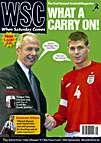 Expectations were low for Colombians Once Caldas going into July's Copa Libertadores final. Jake Lagnado explains how they pulled off one of the biggest shock in South American football history
Expectations were low for Colombians Once Caldas going into July's Copa Libertadores final. Jake Lagnado explains how they pulled off one of the biggest shock in South American football history
When Colombia’s Once Caldas beat Boca Juniors 2-0 on penalties in the second leg of the Copa Libertadores final on July 1, it wasn’t just the quality of both sides’ penalties that shocked South Americans. Few had expected a team who in just two previous attempts had never made it past the first round, to beat the illustrious victors of three of the past four finals. Boca manager Carlos Bianchi was so aggrieved he did not even lead his team up the podium afterwards claiming unconvincingly that he was so used to winning he was unaware that losing teams got medals too.
A 0-0 draw in Buenos Aires set up the win. When John Viafara scored for Once Caldas in the seventh minute back in their home town of Manizales, the Argentines were clearly going to be up against it, although they still managed an aggressive comeback, which ended in Nicolas Burdisso’s deserved 51st-minute equaliser taking things to the wire.
Flour bombs were flying as the locals celebrated in traditional fashion afterwards in Manizales and the surrounding province of Caldas. In Argentina, too, there were celebrations: Buenos Aires woke up the next morning to find itself covered in piss-taking posters pasted up by River Plate fans, in what has become a ritual whenever one of the two great rivals loses a big game.
But life has not always seemed so good in Caldas. As part of the so-called Coffee Belt, it was once the most prosperous region of Colombia. But since the 1980s world coffee prices have been in free fall and so the locals, including Once, have had to learn to get by on very little. As a result the club twice took to selling their own name to corporate sponsors, becoming Cristal Once and then Caldas Philips before reverting to Once Caldas in 1994.
Such good business-like habits have gradually helped Once establish themselves as one of Colombia’s top clubs. In 1999, leading striker Edwin Congo helped beat River Plate in their first ever Copa Libertadores campaign. His goal that night sealed a deal with Real Madrid as the most costly Colombian player ever, which earned Once enough to buy their own stadium. Club president Jairo Quintero invested the remaining proceeds in a herd of cattle, allowing them to keep their new home in good nick ever since. Their undefeated home record against opponents from outside Colombia at the new ground suggests the new surroundings rubbed off on the players, too.
Manager Luis Montoya and his team did not have an easy passage to the final – they knocked out the Brazilian giants Santos and São Paulo, the latter through a 90th-minute goal from Jorge Agudelo, who later confirmed his local hero status by converting one of Once’s penalties against Boca. Unfortunately we might not hear much from Agudelo in the future: a positive drugs test subsequently ended in his withdrawal from the Once squad and an international ban. His defence – that he had only drunk a perfectly legal tea made from coca leaves – did not wash with critics seeking to dampen the celebrations with allegations of foul play.
Critics have also moaned at the ultra-defensive tactics that helped Once avoid defeat away from home all but once, preferring the entertaining approach that made Atlético Nacional the only other Colombian winners of the Copa way back in 1989 and which characterised the national side of the early Nineties.
Could the long dormant national side now learn something from Once’s winning formula? Just weeks after the final, national boss Reinaldo Rueda took Colombia to the Copa America in Peru to defend their title. Their eventual 3-0 semi-final defeat at the hands of Argentina was generally seen as a poor end to a relatively successful warm-up for the World Cup qualifiers, during which a young team still under construction showed their promise.
Defeat yes; tragedy no read one newspaper headline afterwards. Tell that to Boca Juniors fans.
From WSC 211 September 2004. What was happening this month